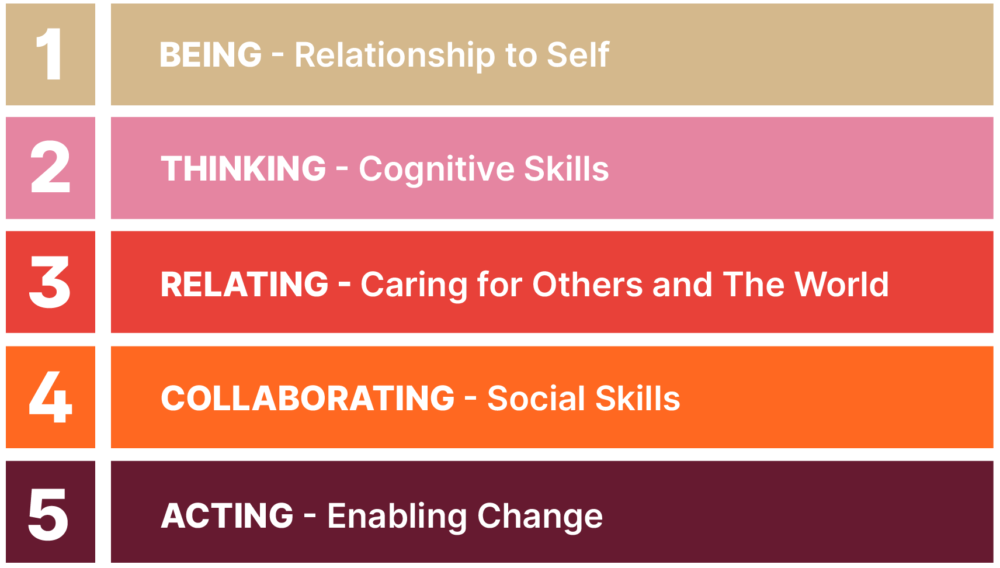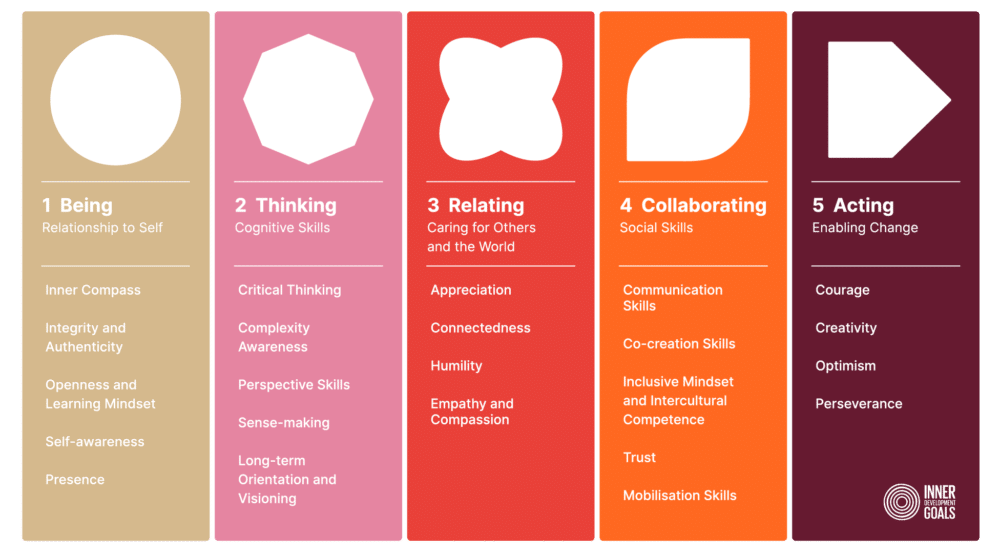The Inner Development Goals Framework simplifies a complex field of human development to help us better identify understand communicate develop integrate
the inner skills needed for sustainable development.

Without the development of transformational skills at scale, external solutions to our global challenges may be limited, too slow or short-lived.
The IDG Framework aims to be a simplified global language that aims to help people understand what inner development can look like and why it matters for catalysing outer change.
Co-created by more that 1000 experts, scientists and practitioners, the IDG Framework consists of 5 dimensions with 23 skills of human inner growth and development.
Inner does not equal individual. We believe that the nature of inner development is inherently collective, systemic, multidimensional, nonlinear, complex, emergent, and messy.
Discover how Being, Thinking, Relating, Collaborating and Acting become a unified catalyst for global change.
IDG Framework Translations: Co‑Created by Our Global Community
At Inner Development Goals, we deeply believe that inner development is universal, and that it must speak in every language to reach its full potential. Thanks to the dedication of our IDG Hubs, networks, academic partners, and research circles, the framework has been carefully translated into multiple languages so it can be accessed, practised, and shared around the world.
Why It Matters
Translating the IDG Framework helps people everywhere explore and embody the 23 skills across 5 dimensions: Being, Thinking, Relating, Collaborating, and Acting, in culturally meaningful ways. Whether in classrooms, boardrooms, or grassroots initiatives, these translations ensure inner leadership becomes relevant in every context.
Can’t find your language?
If you don’t see your local language listed here yet, we’d love your help. Join our global co-creation effort by translating the framework in collaboration with your local community. Whether you’re a translator, mentor, or local IDG community member, your contribution helps make these tools more inclusive and accessible.
Want to contribute?
Click here to connect with our translation community and find out how you can help bring the framework to life in your language.
Let’s co-create together and make inner development truly universal
Click Here to See all available translations
Català – Catalan (ES) | 繁體中文 – Simplified Chinese | 简体中文 – Traditional Chinese | Dansk – Danish | Deutsch – German | Dutch | English | Español – Spanish | Français – French | Suomi – Finnish | Svenska – Swedish | Türkçe – Turkish | Українська – Ukrainian | Italiano – Italian | 日本語 – Japanese | Portugues – Portuguese (BR) | Wolof (Senegal) |
23 Skills Across 5 Dimensions.
The initiators of the IDG Initiative were motivated by a belief that there is a blind spot in our efforts to create a sustainable global society. We have accumulated much knowledge about the climate crisis, poverty, public health, and other social ills communicated in the United Nations’ Sustainable Development Goals (SDGs). However, we seem to have an underdeveloped capacity to deal with our increasingly complex environment and challenges. We have a vision of what needs to happen but progress towards this vision has been disappointing as technical solutions and public policy, which comprise the majority of approaches today, are insufficient on their own.
Fortunately, modern research shows that the inner abilities we need to face and overcome these complex challenges can be developed. What is missing is a keen insight into what abilities, qualities or skills we need to foster among individuals, groups and organisations that play crucial roles in working to fulfil these visions. In 2021, a series of meetings were organised with founders, CEOs, HR managers, sustainability managers and influential figures in both the private and public sectors, as well as many discussions with researchers and leaders from prominent academic institutions. With collaboration, they formulated a key survey question that could collect as much relevant input as possible on which skills and qualities are most important to work more effectively towards the SDGs. After analysis of the 800 responses and several iterations, 23 skills and qualities of human inner growth and development were identified and, in order to have a more pedagogical framework, organised into five dimensions.
The IDG Framework has co-creation at its centre, with ongoing development and input from experts, scientists, practitioners and organisations worldwide.
Co-Create With Us
Convening a global conversation on the inner skills and qualities that matter.
The IDG Framework gives us a language to address the question of how humans can create a future worth living in.
Now, let’s have that conversation.

Integrating the Framework
Business Partnerships
Multinational corporations like Google, Ikea and Ericsson are among the first collaborating partners to incorporate the IDG Framework into their organisations and more intentionally work on the inner skills needed for sustainable change within the company. IDG has more than 50 global corporate and institutional partners.
Global Collaborators
Collaborative efforts with IDG Country Centres and a Global Leadership for Sustainable Development (GLSD) programme have been initiated to develop and strengthen leadership capacities across all sectors, ensuring a more integrated approach to sustainable development that includes both external and inner dimensions.
Grassroots Movements
There is a global community of practitioners, scientists, employees, consultants, coaches, and more who are working together to put the IDG Framework into action collectively. These grassroots initiatives are supported, not controlled, by the IDG Foundation. There are 700+ Hubs across 90+ countries.
Education & Academia
The IDG Foundation has co-creation at its centre with ongoing development and input from scientists, academic partners and researchers worldwide. The IDG Framework has been adapted for research, integrated into classroom activities and invites diverse stakeholder’s contributions.
The IDG Framework is not another framework to implement, rather it is a lens that helps map, understand, and refine your strategy.
Going Deeper
The framework’s simplicity is a design principle, both keeping it easy to communicate and relatively ‘naked’ or decontextualised, ready to be re-contextualised within specific training or personal development approaches…
The strength of the IDG Framework lies in its flexibility. While it offers a map for inner growth, it does not prescribe a one-size-fits-all approach, nor does it represent a training curriculum in itself.
This adaptability allows it to be tailored to diverse cultural and societal contexts, ensuring its relevance across different settings.
We recognise the relationship between individual and collective skills and qualities.
The 23 capacities are often properties of systems rather than individuals, and we believe the framework can be used as a starting point for exploring both individual and collective skills and qualities and how culture, organisations and institutions can support the development needed.
By recognising its limitations and continuously refining the framework in response to feedback, the IDG Framework can become an increasingly robust and globally transferable tool in the quest for a sustainable and equitable future.
While frameworks like the SDGs provide quantifiable targets, the IDG Framework’s emphasis on inner qualities and personal growth can be seen as less tangible.
How does one measure self- awareness or empathy without depending on self-reports? Can such intangible goals be universally applied, given the diverse cultural and societal contexts across the globe?
Such questions continue to be addressed through discourse and research, and it is essential to recognise that personal growth may manifest differently across cultures.

